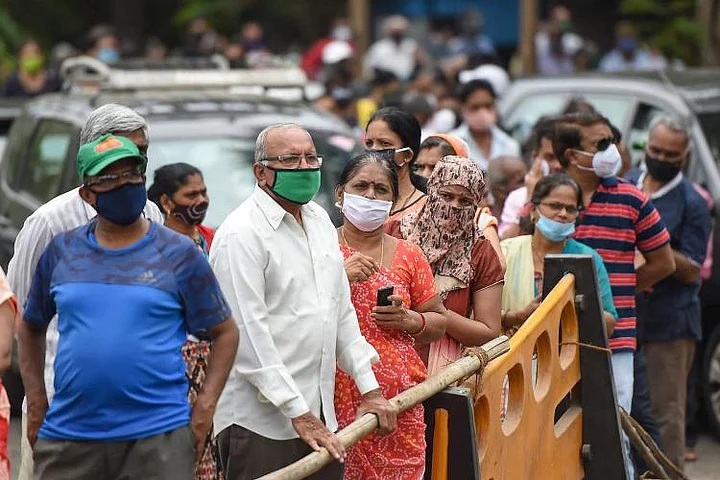Kerala Chief Minister Pinarayi Vijayan recently said that variants that were first detected in the United Kingdom and South Africa have been identified in the state. In addition, the ‘double mutant’ variant that is widely prevalent in Maharashtra, has also been reported in Kerala.
“Of the total cases now detected 40% are from these variants, which include 30% of the UK variant, while 7% is the double mutant strain and 2% is the one from South Africa”Pinarayi Vijayan, Kerala Chief Minister
The state began surveillance in December 2020 when a new coronavirus variant was identified in the UK. At that time, the caseload in Kerala was on a diminishing trend since September and the average number of daily reported cases stood around 6,000.
With the start of the second COVID-19 wave in February, Kerala began sequencing samples to identify the variants in the state. “Three new variants have been found in the state from the samples collected prior to the elections. Two of these are the B.1.67 (double mutant) variant and the B.1.351 (South Africa) variant. These variants were found in samples collected from March 2021 but they were not found in samples collected prior to that. B.1.67 is an Indian variant that has been rampantly present in Maharashtra while B.1.351 is a South African variant,” Vinod Scaria, a scientist at the CSIR-Institute of Genomics and Integrative Biology (CSIR-IGIB), New Delhi, told TNM.
Kerala had tied up with CSIR-IGIB in November 2020 for genome sequencing to understand the mutation of the novel coronavirus. Experts say that it is normal for the coronavirus to mutate.
The district-wise sequencing of samples is still going on while a state-wise study was completed in 2020. The report of the study, conducted in association with the Kozhikode Medical College, was submitted to the government but its details haven’t been published yet.
Fast spread, from 3% to 30% in one month
According to Vinod, the spread of the UK variant increased 10 times from February to March in Kerala. “The third is the B.1.1.7 (UK) variant, which has been found in large proportions in the state. It’d been found in the state back in February but only in 3% of the samples. But in March it was found in 30% of samples collected. This indicates how fast the virus spreads – from February to March the spread increased from 3% to 30%,” Vinod said.
However, the South Africa variant has been found in very less proportion in Kerala.
Two ways of studying mutation
The mutation is studied in two ways in Kerala; one is by genome sequencing and second is by sequencing spike protein in a sample. Genome sequencing involves studying the order of bases present in the entire genome organism. The second method is faster and hence can be done for more samples. There are 12 centres in Kerala, both under the Kerala and Union governments, carrying out genome sequencing and spike protein sequencing. CSIR-IGIB is also entrusted with genome sequencing.
Last year the study was done in Kozhikode and adjoining areas by collecting 200 samples. Now the study is being done in all districts by collecting 100 samples from each district. “With this, we can say what variant is spreading in each district. The district-wise study is more relevant as population dynamics are not the same in all the districts of the state. The presence of the UK variant is high in border districts such as Palakkad, Wayanad and Kasaragod. Also, it is higher in bigger cities like Kozhikode and Ernakulam, where a large number of people mingle with each other and so the probability of transmission is high,” Vinod said.
Infectious variants
Both the variants that were first detected in the UK and South Africa are infectious and are classified as Variants of Concern (VoC). “Because these variants transmit rapidly, we’re seeing more people needing hospitalisation. It can even lead to increase in the mortality rate,” Vinod said, adding that the UK variant is the one that has been found rampant in Delhi.
“The public should consider this a serious message as the infectivity (transmission from one person to another) is high with these viruses.”Dr Chandni Radhakrishnan, Kozhikode Medical College
“Mutation will keep on happening and we may not be able to identify each mutation. The only way to prevent the transmission is for people to be more cautious, practise physical distancing, and if possible wear double masks,” Vinod said.
Double masking is being widely advised ever since the second wave as protection from getting infected. Double masking is wearing a cloth mask over a surgical mask, as not all people are able to afford N95 masks.
“It’s up to people to be more cautious rather than for the government to come out with stringent measures such as a lockdown. Also, there’s no point in finding solace in saying that the caseload is less in one district because the situation is grave,” Dr Chandni added.
Vaccine efficacy against mutated variants
According to Vinod, COVID-19 vaccines have efficacy against the mutant variant too. The Union Health Ministry recently stated that both Covishield and Covaxin are effective against the UK variant. While Covishield is less effective against the South African variant, studies are underway to understand Covaxin’s efficacy against the same. Hyderabad’s CCMB to study whether COVID-19 vaccine works against double mutant variant.
(This was first published on The News Minute and has been republished with permission.)
(At The Quint, we question everything. Play an active role in shaping our journalism by becoming a member today.)
